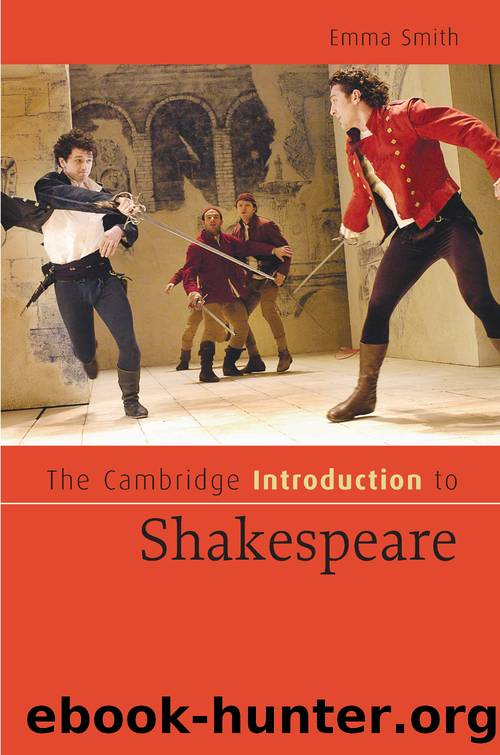The Cambridge Introduction to Shakespeare by Emma Smith

Author:Emma Smith
Language: eng
Format: epub
Publisher: Cambridge University Press
Linguistic shifts: 1 Henry IV
While it is difficult to make a sustained distinction, other than a formal one, between Shakespeare’s use of prose and of verse, moments which shift from one to the other call attention to both forms. As an example, let’s look at the opening act of 1 Henry IV. The play opens at court, as the king voices the parlous state of the nation:
So shaken as we are, so wan with care,
Find we a time for frighted peace to pant,
And breathe short-winded accents of new broils
To be commenced in strands afar remote
(1.1.1–4)
Henry’s opening speech is over 30 lines long and the whole scene’s length of 107 lines comprises only nine speeches. This is a scene in which sense of urgency in the ‘short-winded accents’ is belied by the apparently ordered linguistic sequence, as the speakers complete their lines in measured and explicatory verse. The next scene introduces us to a very different cadence. Falstaff asks ‘Now, Hal, what time of day is it, lad?’, and the Prince answers in prose: ‘Thou art so fat-witted with drinking of old sack, and unbuttoning thee after supper, and sleeping upon benches after noon, that thou hast forgotten to demand that truly which thou wouldst truly know. What a devil has thou to do with the time of day?’ (1.2.1–5). The more casual world of the tavern and its relation to the court is exemplified in this shift of rhythm. Short, interrupted speeches between the Prince and Falstaff give a sense of easy-going and boisterous friendship, in which shared wordplay serves to establish the rapport between the characters.
The linguistic contrast between the first two scenes of the play conveys the dynamic – between public and private, between political and domestic, between verse and prose – which the Prince must negotiate during the course of the play. But lest we feel anxious about the outcome of this dialectic, we are reassured with an early aural indication of Hal’s ability to straddle both worlds – his bilingualism. After he and Poins have set up the trick they intend to play on Falstaff, the Prince is left alone on stage. Cue a soliloquy – in blank verse:
I know you all, and will a while uphold
The unyoked humour of your idleness.
Yet herein will I imitate the sun,
Who doth permit the base contagious clouds
To smother up his beauty from the world,
That when he please again to be himself,
Being wanted, he may be more wondered at
By breaking through the foul and ugly mists
Of vapours that did seem to strangle him.
(1.2.155–63)
Download
This site does not store any files on its server. We only index and link to content provided by other sites. Please contact the content providers to delete copyright contents if any and email us, we'll remove relevant links or contents immediately.
| African | Asian |
| Australian & Oceanian | Canadian |
| Caribbean & Latin American | European |
| Jewish | Middle Eastern |
| Russian | United States |
4 3 2 1: A Novel by Paul Auster(12363)
The handmaid's tale by Margaret Atwood(7750)
Giovanni's Room by James Baldwin(7315)
Asking the Right Questions: A Guide to Critical Thinking by M. Neil Browne & Stuart M. Keeley(5751)
Big Magic: Creative Living Beyond Fear by Elizabeth Gilbert(5745)
Ego Is the Enemy by Ryan Holiday(5409)
The Body: A Guide for Occupants by Bill Bryson(5072)
On Writing A Memoir of the Craft by Stephen King(4925)
Ken Follett - World without end by Ken Follett(4718)
Adulting by Kelly Williams Brown(4562)
Bluets by Maggie Nelson(4542)
Eat That Frog! by Brian Tracy(4513)
Guilty Pleasures by Laurell K Hamilton(4437)
The Poetry of Pablo Neruda by Pablo Neruda(4088)
Alive: The Story of the Andes Survivors by Piers Paul Read(4017)
White Noise - A Novel by Don DeLillo(3999)
Fingerprints of the Gods by Graham Hancock(3983)
The Book of Joy by Dalai Lama(3968)
The Bookshop by Penelope Fitzgerald(3841)
